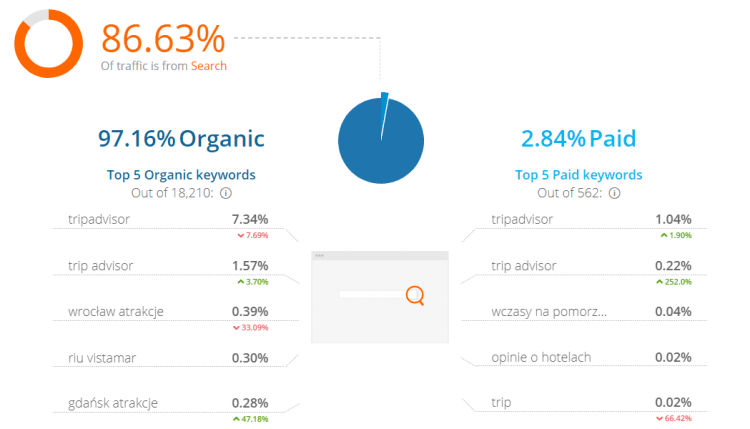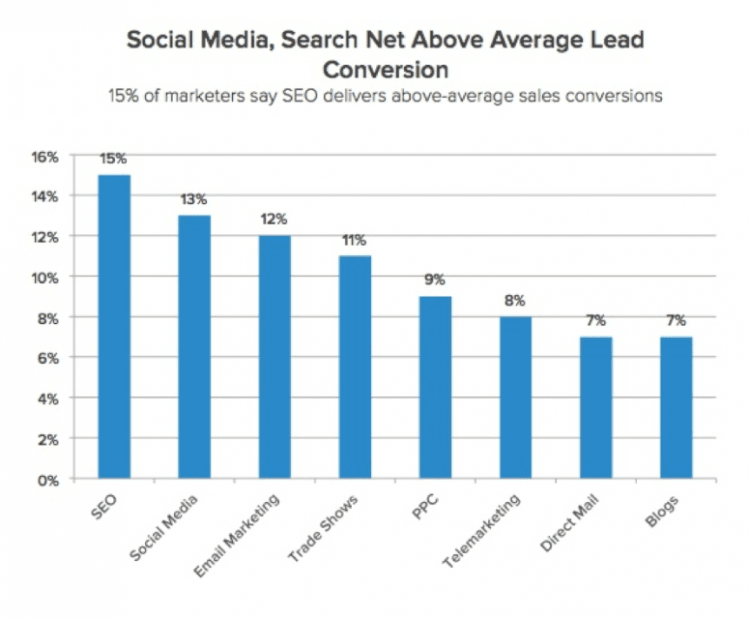CEO on SEO – How To Convince Your Boss To Create an SEO Budget

Do you work in marketing department, and one of your core goals is increasing your business website organic traffic? You know well yourself that SEO does pay off, but have no clue how to make a compelling argument for your CEO? Find the tips below!
1. SEO is a long game itself – so is investing in it
An annual marketing specialists’ concern about SEO is if it’s still working – or have paid Google Ads already taken over the search results. And every time they’ve come to the same conclusion: SEO does work now, and it will keep on working! “That’s a fact. It’s a thing we can’t deny.” And the reason for this is that the users are used to asking Google all sorts of questions, even – or mostly – silly ones, to find actual answers. And they put much more trust in the organic search results, than in the paid ones.
Even well-known websites often get most of the website traffic through organic results. According to SimilarWeb, over 81% of traffic on the .com version of TripAdvisor page comes from search results, and over 98% of them are free search results.
Why are we focusing on Google? Undoubtedly, Google controls the overwhelming majority of the global search engine market. That’s 90% of Internet users, generating over 3.5 billion queries on a daily basis.
So SEO definitely seems like a good investment, but is it long-term? Without going to deep (which you can find e.g. here: “What Are Top 10 Elements of an SEO Process?“) the SEO process consists of many elements and its foundations remain, despite Google constantly changing the rules, i.e. algorithms, unshaked. A domain optimization is to be done on a continuous basis, however, changes once introduced, stay there forever. If the SEO process ceases, the effects won’t disappear immediately. Over time the algorithm updates and competing SEO may engender ranking drops, however, it’s always something that you can react to.
2. Long tail SEO boosts your conversion rate
Setting up a well-designed website, featuring dozes of already sought-after products and a mobile version on top of that, is quite a start. But the website won’t take you anywhere far, without the search engine visibility or if it keeps appearing for all the wrong Google queries.
The Google TOP10 of search results answering very general queries (e.g. good phone) seem to be already secured by the big market players. And that’s a fact, too. However, will a person seriously planning a phone purchase google simply “good phone” to find out more about the products?
No! The experienced Googlers use way more specific queries, as the algorithms can aptly find great matches. Brand, model ID, memory or color – those details are nowadays used to find out what’s needed. And now, if it’s your page that ranks for such a query highly, you are likely to have found a customer who is looking for a specific product that you offer. And that’s long tail – optimization targeting long, complex key phrases.
3. Your competition’s already there
Have you ever played hot chairs? Immediately as the music ceases, everyone runs to the chairs, and whoever fails to secure a seat, loses. They’re out of the game.
Now imagine that the chairs are Google’s 1st search results page slots. If you fail to secure a place for yourself there, the game’s over for you. Your competition knows it too, hence their SEO budgets. And here’s the trick – even when you have only few physical competitors, your Google competition can still be strong. A single company’s SEO process can secure several results for the same query, effectively blocking the competition out.
In addition, as in the game of hot chairs, Google keeps reducing the TOP rankings by replacing them with paid ad opportunities.
Make sure that when the music stops, your business will have a seat.
4. Local SEO supports direct sales
Walking down the street, how many people with their nose in screen can you see? Dozens… Maybe they message someone a daily at-work-f*ckup report, or a rice-cooking report, for that matter. Or maybe they are looking for “best sushi place” around, or hunt sneakers bargains downtown. They search takes place their phone, but the deal will be closed in real life.
Googling locally, users customary add a location keyword at the end of the query. Mobile era allows willing customers to find a tailored offer in an instant – as they want the info in no longer time. According to a research by Google, up to 50% of local inquiries converted into paying an actual visit in the physical store or place on the same day.
If you’re running a local business, be sure to have a loca SEO process focusing on local keywords; having a Google My Business page will help a lot, too.
5. High ROI from SEO
Despite the increasing social media share of marketing, SEO still boasts the highest rate of return on investment. First of all, it is still your regular organic traffic that has the highest conversion rate per a sales lead (according to HubSpot’s research).
Moreover, the same research indicate that SEO generates 14% of all leads, while SEO budget allocation is up to 12% of the whole marketing budget in large companies. For comparison, PPC (paid search results) generate 6% of leads, using 8% of the budget.
Undoubtedly, in the long-term perspective, SEO achieves the best ROI; however, in the short-term it may seem unprofitable, since the results are not there immediately.
6. When will the SEO investment effects appear?
Trying to talk your marketing manager into SEO, do not forget to mention an unquestionable – for him, at least – disadvantage of the positioning. The effects of SEO actions are not immediately visible. Before any good comes out of SEO, Google has to trust your website, and before you’ll find yourself ranking in TOP3, a certain credibility needs to be built.
Speaking short term, it may seem like a waste of money, but for the discouraged ones, the effects usually appear after about 3 months after the SEO process is launched. Over time, the more you invest in SEO, the greater and more long-lasting effects you will achieve.
CEO on SEO
Mind that your CEO or even a marketing manager isn’t necessarily familiar with the SEO terminology and principles. It may be frustrating for you, but it’s perfectly understandable, too. To make a compelling argument, present the expected benefits of the investment in SEO and support it with a solid research. Focus on facts and clearly explain how the investment will return. Also remember to report on the results regularly (e.g. every month or two).




